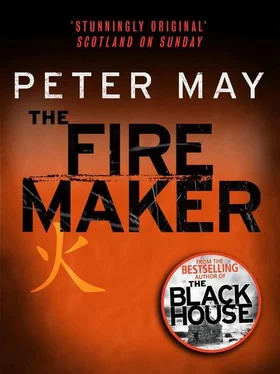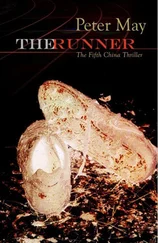She saw him lying sleeping, his face only inches from hers, his head tilted slightly as if he were about to kiss her. She felt a strange ache inside as she remembered her final thought before succumbing to sleep. She tipped her head forward to kiss him and saw his eyelids flicker, and closed hers as he opened his.
He smiled when he saw that her eyes were shut. Then, after a moment, they opened again, and she returned his smile. He kissed her softly, feeling the gentle give of her lips against his. She responded, and opened her mouth in a desire to draw him in. They were moved now by something beyond passion or lust. Beyond time. For there seemed no need to rush, and every reason to savour. The sun beat in through the grimy window of the abandoned carriage, bathing their bodies in heat and light as they moved together, joined by love and sadness, affinity and death. Her breasts filled his hands and his mouth, her skin sweet on his tongue. She felt all the fine muscles of his back, firm buttocks that she grasped and pulled towards her, drawing him inside. He was so beautiful she never wanted to let him go. He filled her with himself, moving slowly to the rhythm of their hearts. She gasped, almost sobbing. It was a pleasure close to pain, on the edge of endurance. Her fingers dug into his back, trying to hold him there, to draw him deeper, to finally consume him, until he exploded inside her and she lost all control, wave after wave of ecstasy washing over senses numbed by years of indifference. A convolution of muscles and nerves that robbed the brain of independent thought and immersed them both in unashamed abandon. Nothing mattered now, nor ever would again.
They lay naked, breathless and damp in one another’s arms, the sun burning their skin hot through the window. For ten, perhaps fifteen minutes, neither of them spoke. Neither wanted to break the spell, to end the moment, to bring them back from some distant euphoria to their present peril. Eventually Li reached for a cigarette and blew smoke at a ceiling stained brown by nicotine. He said, ‘Is there any hope for us?’
She inclined her head to look at him. She could say that maybe a cure would be found in time, that RXV would prove much easier to defeat than AIDS, but it seemed unlikely, and what merit was there in false hope? But then she stopped herself, her heart pounding suddenly. Look for hope, she thought, and you will find it. For there is never any place in the world without light. She had accepted McCord’s hopelessness, his dark despair, without thought. But now she replayed the scene they had acted out on moonlit marble and saw light for the first time.
Li saw that light in her eyes. He had asked for hope without hope of it, and witnessed now the unexpected effect it had had on her. ‘What is it?’
She sat upright. ‘Why did they kill him?’
‘Who?’
‘McCord. He was on their side. One of them.’ She turned bright eyes on him, the light of revelation now illuminating them. ‘He was panicking. That’s why. He was a loose cannon. He couldn’t see what they saw — a point in covering it up. I even asked him why they were bothering. He said they were stupid. But they’re not stupid people. They wouldn’t be trying so hard to cover up if they thought there was no point. And if they believe there’s hope, then there must be.’
Li shook his head. ‘I don’t understand.’
Her mind raced back over McCord’s revelations in the shadow of the Hall of Prayer for Good Harvests The research team lived on the stuff for a year before we ever went public with it , he had said. And no one died of cholera toxin or mosaic virus . ‘They’d all been eating the rice,’ she said. ‘Five years ago. And yet only Chao was dying, that we know of.’ In all her excitement she was briefly struck by the thought that there was no greater folly than self-delusion. But this was no false hope, she was sure of it. ‘Maybe,’ she said, ‘not everyone who eats the rice gets the virus. Maybe not everyone who gets the virus dies of it. Maybe, with the huge resources Grogan Industries have at their disposal, they genuinely believe that a cure is possible. Why else would they be playing for time?’ She felt like the prisoner in the condemned cell who has just had word of a last-minute reprieve. Death had been postponed, maybe temporarily, maybe till it would have come anyway. But the sentence was no longer inevitable.
‘You mean you think we won’t die?’
‘Of course we will die! We all die! But maybe, just maybe, we won’t die of RXV.’ And with hope came the return of anger. ‘That’s why the world has got to know about it. We can’t just leave it in the hands of Grogan Industries.’ She threw her head back and gasped in exasperation. ‘And do you know what the real irony is? The profit motive that drove the development of the super-rice in the first place is the same motive that will drive the development of a cure. There is no money to be made from healing obscure or unfashionable illnesses. But imagine what rewards there would be in wiping out a virus that threatens to kill half the world’s population!’
She searched his eyes for some sign that he shared her excitement, her hope. But he seemed a long way away. Finally, he returned from that distant place and met her eye. ‘They must not be allowed to get away with it,’ he said. ‘Grogan and Pang and the rest.’ He saw his uncle impaled on his own sword.
‘No, they mustn’t,’ Margaret said.
Li gazed up at her for a minute or more. Then he said, ‘I love you, American lady.’
Her heart seemed to be in her throat. Her voice came as little more than a whisper. ‘I love you, too, Chinese man.’
And they held each other on the fold-down bed in the compartment of a condemned sleeper car in this industrial city in the north of China for a very long time, embracing for the first time the hope of a future together.
Yongli returned in the late afternoon. Li and Margaret had eaten some of the fruit that Lotus had packed in the holdall, and they had talked, endlessly. She told him about her childhood in upstate Illinois, summers in New England, the day her grandfather had a stroke and her brother drowned in the lake. He talked of his boyhood in Sichuan, the horrors of growing up in the Cultural Revolution, the loss of his mother. There was so much they had to tell each other, and neither had any idea of how long they might have to do it.
They saw Yongli hurry across the rusted tracks, glancing cautiously around him, his lengthening shadow following in his wake. They heard him climb aboard and his steps heavy in the corridor. He was breathing hard and perspiring when he reached their compartment. ‘That was a lot harder than I thought,’ he said. ‘But I got us some wheels.’ He pulled some packs of cigarettes from his pocket and chucked them on one of the beds. Margaret handed him some bottled water and he drank gratefully. He wiped his mouth with his sleeve and slumped on to the bed. ‘Cost me an arm and a leg. It’s no great shakes, but it should do the mileage there and back okay. I’ve to pick it up just after ten tonight.’
Ten o’clock seemed an eternity away. The afternoon dragged by into evening, and still ten o’clock seemed a distant prospect. Yongli’s return had put an end to Li and Margaret’s conversation. She glanced at him frequently as he sat in the corner smoking. He must have been aware, surely, that his presence had had an inhibiting effect on them? He was surly and withdrawn, so different from the sparkling young man she had met that night in the Xanadu, when he had indulged in a verbal fencing match with her, a battle of wits. But then Li, too, in spite of their revelations of hope, seemed to have descended into the same trough. Perhaps it was infectious. The gloom that settled over Datong as the sun slid down in the west seemed to reflect their collective mood. Two hours earlier they had seen the work gang they had followed that morning, returning from some detail to the north, heading home for a hot meal, a glass of beer, a night relaxing in front of the television. Now darkness fell and they could see only by the dim glow of reflected light from distant streetlamps.
Читать дальше












